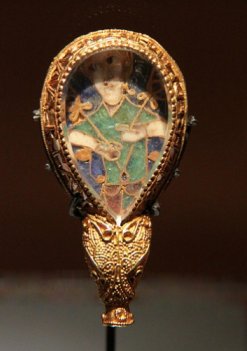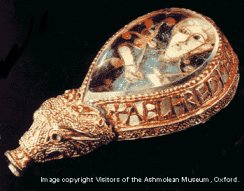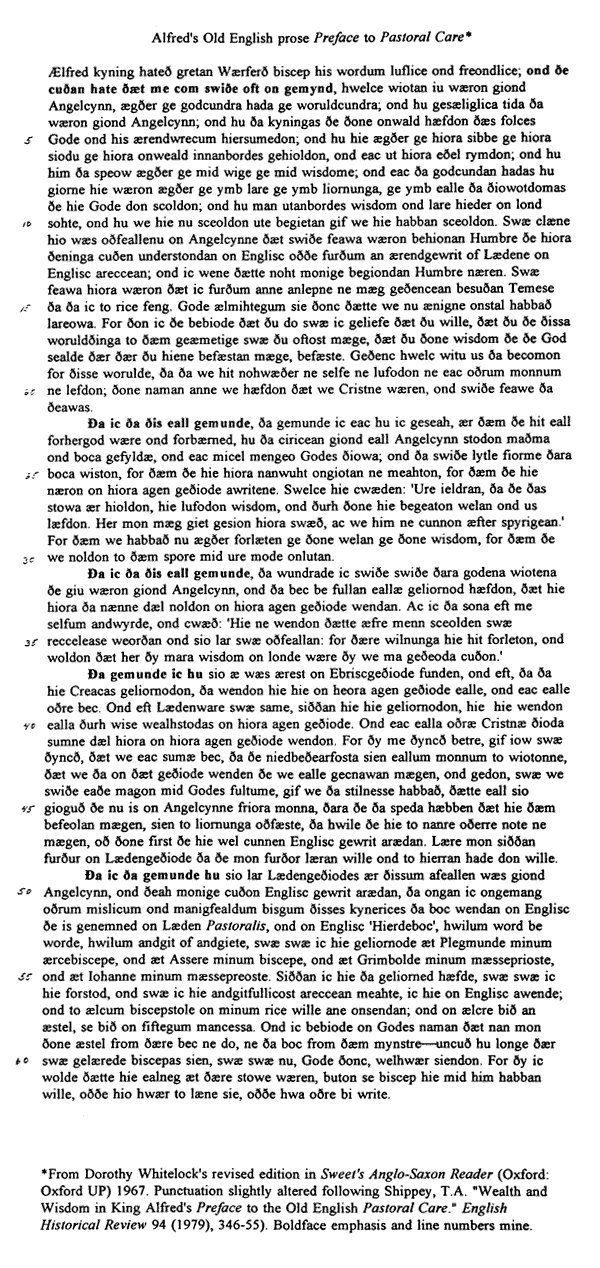What is most interesting about King Alfred is his pursuit of education. Once King Alfred had obtained relative peace, he spent the last decades of his life devoted to learning. It is known for sure that King Alfred translated at least three Latin texts: The Pastoral Rule, Consolation of Philosophy, and Augustine's Soliloquies.
King Alfred's writings and translations are important because they allow us a rare glimpse into a monarch's own ideas. He was probably most influenced by The Pastoral Rule, which does discuss the role of a ruler. The Pastoral Rule mainly warns against the excessive pride which can result from a king's power. King Alfred believed that a king's downfall from pride could be avoided by gaining wisdom. A wise and spiritual ruler could also bring blessing down upon his people and kingdom. Learning was a spiritual endeavor for King Alfred.
Alfred's love of learning was unique in that as a ruler, he desired his people to become educated as well. The more educated the people were, the more they could learn and improve their perception of God.
Below are King Alfred's own words on being king.
"Desire for and possession of earthly power never pleased me overmuch, and I did
not unduly desire this earthly rule, but that nevertheless I wished for tools
and resources for the task that I was commanded to accomplish, which was that I
should virtuously and worthily guide and direct the authority which was
entrusted to me. You know of course that no one can make known any skill, nor
direct and guide any authority, without tools and resources; a man cannot work
on any enterprise without resources. In the case of the king, the resources and
tools with which to rule are that he have his land fully manned: he must have
praying men, fighting men and working men. You also know that without these
tools no king may make his ability known. Another aspect of his resources is
that he must have the means of support for his tools, the three classes of men.
These, then are their means of support: land to live on, gifts, weapons, food,
ale, clothing, and whatever else is necessary for each of the three classes of
men. Without these things he cannot maintain the tools, nor without the tools
can he accomplish any of the things he was commanded to do. Accordingly, I
sought the resources with which to exercise the authority, in order that my
skills and power would not be forgotten and concealed: because every skill and
every authority is soon obsolete and passed over, if it is without wisdom;
because no man may bring to bear any skill without wisdom. For whatever is done
unthinkingly, cannot be reckoned a skill. To speak briefly: I desired to live
worthily as long as I lived, and to leave after my life, to the men who should
come after me, the memory of me in good works."
King Alfred's Danish Peace Treaty
Medieval Sourcebook: Alfred and Guthrum's Peace
This is one of the few official documents of Alfred's reign. Although fighting continued between the Vikings and the Anglo-Saxons, this treaty marks the end to a war that, as Sir Geoffrey Elton has said, seemed lost when Alfred ascended the throne.
This is the peace that King Alfred and King Guthrum, and the witan of all theEnglish nation, and all the people that are in East Anglia, have all ordainedand with oaths confirmed, for themselves and for their descendants, as well forborn as for unborn, who reck of God's mercy or of ours.
1. Concerning our land boundaries: Up on the Thames, and then up on the Lea,and along the Lea unto its source, then straight to Bedford, then up on theOuse unto Watling Street.
2. Then is this: If a man be slain, we estimate all equally dear, English andDanish, at viii half marks of pure gold; except the ceorl who resides on rentedland and their [the Danes'] freedmen; they also are equally dear, either atcc. shillings.
3. And if a king's thegn be accused of manslaying, if he dare clear himself onoath, let him do that with 12 king's thegns. If any one accuse that man whois of less degree than the king's thegn, let him clear himself with xi of hisequals and with one king's thegn. And so in every suit which may be more thaniv mancuses. [A money of account representing thirty pence] And if he darenot, let him pay for it threefold, as it may be valued.
4. And that every man know his warrantor in acquiring slaves and horses andoxen.
5. And we all ordained on that day that the oaths were sworn, that neitherbond nor free might go to the host without leave, no more than any of them tous. But if it happen that from necessity any of them will have traffic with usor we with them, with cattle and with goods, that is to be allowed in thiswise: that hostages be given in pledge of peace, and as evidence whereby itmay be known that the party has a clean back.
 The Alfred Jewel The figure in the jewel represents Christ as True Wisdom. It is an image that fits well with Alfred's priorities. |  |
King Alfred's preface to his translation of the Pastoral Care in Old English  Translation of Alfred's Prose Preface to Pastoral Care King Alfred bids bishop Wærferth to be greeted with loving and friendly words; and bids you to know that it very often comes to my mind what wise men there formerly were throughout England, both of sacred and secular orders; and how happy the times were then throughout England; and how the kings who then had power over the people obeyed God and his ministers; and they maintained their peace, their morality and their power within their borders, and also increased their kingdom without; and how they prospered both with war and with wisdom; and also how eager the sacred orders were about both teaching and learning, and about all the services that they ought to do for God; and how men from abroad came to this land in search of wisdom and teaching, and how we now must get them from abroad if we shall have them. So completely had wisdom fallen off in England that there were very few on this side of the Humber who could understand their rituals in English, or indeed could translate a letter from Latin into English; and I believe that there were not many beyond the Humber. There were so few of them that I indeed cannot think of a single one south of the Thames when I became king. Thanks be to God almighty that we now have any supply of teachers. Therefore I command you to do as I believe you are willing to do, that you free yourself from worldly affairs as often as you can, so that wherever you can establish that wisdom that God gave you, you establish it. Consider what punishments befell us in this world when we neither loved wisdom at all ourselves, nor transmitted it to other men; we had the name alone that we were Christians, and very few had the practices. Then when I remembered all this, then I also remembered how I saw, before it had all been ravaged and burnt, how the churches throughout all England stood filled with treasures and books, and there were also a great many of God's servants. And they had very little benefit from those books, for they could not understand anything in them, because they were not written in their own language. As if they had said: 'Our ancestors, who formerly held these places, loved wisdom, and through it they obtained wealth and left it to us. Here we can still see their footprints, but we cannot track after them.' And therefore we have now lost both the wealth and the wisdom, because we would not bend down to their tracks with our minds. Then when I remembered all this, then I wondered extremely that the good and wise men who were formerly throughout England, who had completely learned all those books, would not have translated any of them into their own language. But I immediately answered myself and said: 'They did not think that men ever would become so careless and learning so decayed: they deliberately refrained,for they would have it that the more languages we knew, the greater wisdom would be in this land.' Then I remembered how the law was first composed in the Hebrew language, and afterwards, when the Greeks learned it, they translated it all into their own language, and also all other books. And afterwards the Romans in the same way, when they had learned them, translated them all through wise interpreters into their own language. And also all other Christian peoples translated some part of them into their own language. Therefore it seems better to me, if it seems so to you, that we also translate certain books, which are most needful for all men to know, into that language that we all can understand, and accomplish this, as with God's help we may very easily do if we have peace, so that all the youth of free men now in England who have the means to apply themselves to it, be set to learning, while they are not useful for any other occupation, until they know how to read English writing well. One may then instruct in Latin those whom one wishes to teach further and promote to a higher rank. Then when I remembered how knowledge of Latin had formerly decayed throughout England, and yet many knew how to read English writing, then I began among the other various and manifold cares of this kingdom to translate into English the book that is called in Latin Pastoralis, and in English "Shepherd-book," sometimes word for word, and sometimes sense for sense, just as I had learned it from Plegmund my archbishop and from Asser my bishop and from Grimbold my masspriest and from John my masspriest. When I had learned it I translated it into English, just as I had understood it, and as I could most meaningfully render it. And I will send one to each bishopric in my kingdom, and in each will be an æstel worth fifty mancuses. And I command in God's name that no man may take the æstel from the book nor the book from the church. It is unknown how long there may be such learned bishops as, thanks to God, are nearly everywhere. Therefore I would have them always remain in place, unless the bishop wishes to have the book with him, or it is loaned out somewhere, or someone is copying it. King Alfred's writing also did much to establish the English vernacular and prose. As Alfred mentions in his preface, it was because Latin had decayed that he translated into English. Alfred's preface to his translation of The Pastoral Rule is important in that it lets us into a king's own thoughts. He mentions how his translation is sometimes word for word, or that he made his own decisions in the translation process. King Alfred was aware of the importance writing and books, and that such things should be preserved for future generations. |